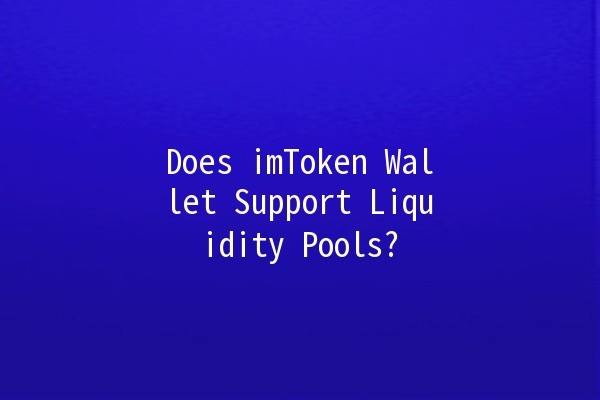The rapidly evolving landscape of blockchain and cryptocurrencies has prompted wallet developers to integrate a plethora of functionalities, one of which includes support for liquidity pools. In this article, we will delve into whether the imToken wallet supports liquidity pools, how this feature works, and some practical tips for both beginners and experienced users regarding their interaction with liquidity pools in a crypto wallet context.
Liquidity pools are essential components in decentralized finance (DeFi). They are collections of funds that facilitate trading on decentralized exchanges (DEXs). Unlike traditional exchanges that match buyers with sellers, liquidity pools allow users to trade against a pool of assets, thereby increasing market efficiency.
When users contribute their assets to a liquidity pool, they become liquidity providers and earn a proportion of the trading fees generated from the trades within the pool. This model offers an incentive for users to lock up their assets, contributing to the overall liquidity of the platform.

For users to interact with liquidity pools, they typically require a compatible wallet that supports these functionalities. The wallet acts as a bridge, allowing users to deposit tokens into liquidity pools and manage their assets effectively. Thus, understanding whether a wallet supports liquidity pools is crucial for any user interested in engaging with DeFi.
As of the latest updates, the imToken wallet does indeed support liquidity pools. Users can connect their imToken wallet to various decentralized exchanges (DEXs) that operate liquidity pools, such as Uniswap and PancakeSwap, allowing them to easily participate in trading and staking activities.
By accessing DeFi platforms through the imToken wallet, users can contribute their assets to liquidity pools and partake in the rewards generated from trading fees. This capability positions imToken as a versatile tool for those looking to maximize their crypto assets through engagement in DeFi activities.
UserFriendly Interface: imToken offers an intuitive interface that simplifies the process of engaging with liquidity pools, catering to both novice and experienced users.
Portfolio Management: Users can efficiently track their crypto assets and investments within the wallet, making it easier to manage pooled assets.
Security Features: With robust security measures, imToken provides users with peace of mind as they engage in DeFi activities.
Before contributing to any liquidity pool, it's essential to understand the risks involved. Research the project and the tokens within the pool, looking at their volatility, community support, and market trends. Tools such as DeFi Pulse can provide insights into various liquidity pools and their performance.
Application Example: Use analytics platforms to track historical performance trends of your chosen liquidity pool. Employ this data to make informed decisions on when to enter or exit a pool.
Trading on decentralized exchanges often comes with variable gas fees, especially on networks like Ethereum. During peak times, gas prices can spike, affecting the profitability of your trades.
Application Example: Utilize gas tracker tools to monitor realtime gas prices and choose optimal times for trading or providing liquidity, minimizing costs.
Just as with traditional investing, diversification can mitigate risks. Avoid putting all your assets in a single pool. Instead, consider spreading your investments across multiple pools.
Application Example: Allocate different percentages of your crypto portfolio across various liquidity pools according to their risk levels and your investment strategy.
Impermanent loss occurs when the price ratio of the tokens in a liquidity pool changes after you deposit them. This loss can affect your returns. Be aware of when to enter and exit pools to minimize exposure.
Application Example: Keep an eye on the price movements of assets in your liquidity pool and assess the relative merits of pulling your liquidity if losses begin to exceed gains.
Participate in forums, Discord channels, or Reddit communities related to DeFi and liquidity pools. Engaging with knowledgeable users can provide valuable insights and updates on trends or strategies.
Application Example: Join Telegram or Discord groups associated with the tokens in your liquidity pools. By staying connected, you can receive realtime updates and advice from seasoned traders and liquidity providers.
Liquidity pools offer the opportunity to earn fees but come with risks such as impermanent loss and platform vulnerabilities. Users should assess their own risk tolerance and conduct due diligence before participating.
Most DeFi platforms allow you to withdraw your liquidity whenever you wish. However, be aware that depending on network congestion, transaction fees, and slippage could affect your withdrawal outcome.
Impermanent loss refers to the situation where the value of your deposited assets decreases compared to simply holding them due to price fluctuations. It is a significant risk for liquidity providers.
Rewards are usually calculated based on the proportion of the pool you own and the total transaction fees generated by trades within that pool. The more you provide, the greater your share of the earnings.
While liquidity pools provide opportunities for earning, your investment is subject to market risks and potential exploits in the smart contracts. Continuous monitoring and Swift decisionmaking can help protect your investment.
You can monitor your rewards directly from the DEX interface or through your imToken wallet. Many DEXs also provide analytics dashboards where you can see your accrued fees.
By leveraging the imToken wallet's features to connect with liquidity pools, users can maximize their crypto holdings while engaging in the dynamic world of decentralized finance. Always remember to perform due diligence and educate yourself on the intricacies of liquidity provisioning to navigate this landscape effectively.